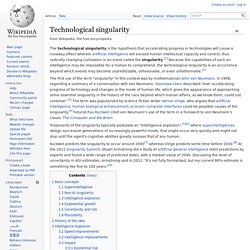

100,000 Stars. Big Think. There are only two events in the universe that defy the laws of physics: black holes and the big bang, and while scientists try to explain them, crucial evidence may be eaten up in the meantime.

Christophe Galfard's book is "The Universe in Your Hand A Journey Through Space, Time, and Beyond" ( Read more at BigThink.com: Follow Big Think here:YouTube: Spooky Quantum Action Might Hold the Universe Together. Brian Swingle was a graduate student studying the physics of matter at the Massachusetts Institute of Technology when he decided to take a few classes in string theory to round out his education—“because, why not?”

He recalled—although he initially paid little heed to the concepts he encountered in those classes. But as he delved deeper, he began to see unexpected similarities between his own work, in which he used so-called tensor networks to predict the properties of exotic materials, and string theory’s approach to black-hole physics and quantum gravity. Ginni Rometty on IBM Watson and AI. Tomorrow__curso perestróika. The Golden Age Of Quantum Computing Is Upon Us (Once We Solve These Tiny Problems) Quantum computing is not easy.

Researchers at IBM recently announced that they had taken a step toward solving one of its biggest challenges: developing a better way to detect and correct annoying errors. In a blog post, Mark Ritter, who oversees scientists and engineers at IBM’s T.J. Watson Research Laboratory, says: "I believe we’re entering what will come to be seen as the golden age of quantum computing research. " We:eX - Wearable Experiments. The World Is Made Of Language. Jason Silva. We Are An Evolutionary Force. Welcome to Inc.com. Como a internet das coisas vai atropelar o capitalismo - Galileu.
Peter Diamandis: Abundance is our future. Presencing Institute. Can You Rewire Your Brain In Two Weeks? One Man’s Attempt… Can you rewire your brain in two weeks?

The answer appears to be — at least partially — yes. The following is a guest post by Shane Snow, frequent contributor to Wired and Fast Company and author of the new book SMARTCUTS: How Hackers, Innovators, and Icons Accelerate Success. Last year, he wrote about his two-week Soylent experiment, which went viral and racked up 500+ comments. He knows how to stir up controversy.
In this post, Shane tests the “brain-sensing headband” called Muse. Will AI Destroy Humanity? Siri, A Chatbot, And A Roboticist Weigh In. In 1906 Samuel Butler pointed out that machines were evolving faster than biology, a popular refrain among Silicon Valley techies today.

And ever since Karel Čapek's 1921 play R.U.R. gave us a common sci-fi trope—a race of self-replicating machine slaves revolt against their human masters—the question has been: will artificial intelligence spell the end of humanity? There was HAL in 2001: A Space Odyssey, then T-800 and T-1000 of the (soon-to-be-revived) Terminator series. These creations have always been, thankfully, relegated to the realm of speculation. Until now, that is. While the constantly-impending arrival of "strong" artificial intelligence is still a matter of scientific debate, lately some very smart humans have been issuing serious warnings about our future robot masters and killers.
Stephen Hawking's Communications Interface Gets Its First Overhaul In 20 Years. For 20 years, Stephen Hawking has used the same system to communicate with the outside world.

Now, the 70-year-old physicist, who suffers from an ALS-like motor neuron disease (MND) and is paralyzed, is getting an upgrade from Intel. In the pre-computer days, Hawking communicated through a painstaking process where a caretaker would go through a group of letters on a board, pointing line by line and letter by letter until Hawking signaled which he was looking for. Then, in the 1980s, he was offered a computer interface that had similar functionality. Scientists Prove That Telepathic Communication Is Within Reach. From one of our previously published articles: A group of international neuroscientists and robotics engineers have discovered for the first time that human brains can indeed ‘talk’ directly to one another, even from thousands of miles away.

A brain-to-brain communication study conducted in coordination with Harvard Medical School has proven that extrasensory mind-to mind interaction can happen over great distances by leveraging different pathways in the mind. (Technological telepathy) The study, coauthored by Alvaro Pascual-Leone, Director of the Berenson-Allen Center for Noninvasive Brain Stimulation at Beth Israel Deaconess Medical Center (BIDMC) and a Professor of Neurology at Harvard Medical School, found that information can be successfully transmitted between two intact human brains from distances over 5000 miles apart.
The following is excerpt from an article featured on Smithsonian Mag: This Video Game Proves That Telepathy Is Possible. A team of computational neuroscientists and psychologists at the University of Washington have managed to create telepathy in their lab, enabling one test subject to use his thoughts to control another test subject's body as he played a video game a mile away.

The game was created by a team led by Rajesh P.N. Rao. The test subjects wore sensor- and magnet-filled hats that vaguely resembled Cerebro in the X-Men comics and movies. The programming and the brain-computer interface used in the study involved players in different buildings playing a simple Missile Commander-like game in which they attempted to protect a city from alien invasion. When players in one building, who were hooked up to a electroencephalography machine, thought about pressing a button on their joystick, that thought was turned into computer-readable data and transmitted to a player in another building, who then involuntarily mashed a button on their joystick, defeating those pesky aliens.
The Singularity Is Near: When Humans Transcend Biology: Ray Kurzweil: 8601400936764: Amazon.com: Books. Technological singularity. The technological singularity is the hypothesis that accelerating progress in technologies will cause a runaway effect wherein artificial intelligence will exceed human intellectual capacity and control, thus radically changing civilization in an event called the singularity.[1] Because the capabilities of such an intelligence may be impossible for a human to comprehend, the technological singularity is an occurrence beyond which events may become unpredictable, unfavorable, or even unfathomable.[2] The first use of the term "singularity" in this context was by mathematician John von Neumann.

Proponents of the singularity typically postulate an "intelligence explosion",[5][6] where superintelligences design successive generations of increasingly powerful minds, that might occur very quickly and might not stop until the agent's cognitive abilities greatly surpass that of any human.